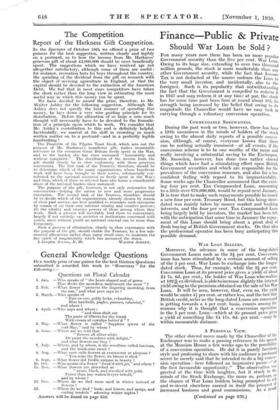The Competition
Report of the Harkness Gift Competition.
IN the Spectator of October 18th we offered a prize of two guineas for the best suggestion, written clearly and legibly on a postcard, as to how the income from Mr. Harkness' generous gift of about £2,000,000 should be most beneficially spent. The suggestions which we have received are not altogether satisfactory, although some of them are useful : for instance, recreation huts for boys throughout the country, the spending of the dividend from the gift on research with the object of reviving agriculture in England, or that the capital should be devoted to the extinction of the American Debt: We feel that in most cases competitors have taken the short rather than the long view in estimating the most useful way in which this money can be spent.
We have decided to award the prize, therefore, to Mr. Walter Ashley for the following suggestion. Although Mr. Ashley does not specify the best manner of spending this money, he lays down a very wise guiding principle for its distribution. Before the allocation of so large a sum much thought will necessarily have to be devoted to the formula- tion of a principle upon which to work. We consider that Mr. Ashley's contribution to this end is definitely helpful. Incidentally, we marvel at his skill in crowding so much written matter on to a postcard—and in a perfectly legible handwriting !
The Preamble of the Pilgrim Trust Deed, which sets out the purpose of Mr. Harlmess's munificent gift, makes memorable reference to the resources Great Britain freely spent in the War, and to the burden she has since sustained " honourably and without complaint." The distribution of the income from the gift should clearly be in close conformity with these generous sentiments. The first task of the Trustees, therefore, should be to determine which of the many organizations, whose beneficent work will have been brought to their notice, substantially con- tributed to the national resources so freely spent in the War ; and then, which of those so selected have also borne a considerable share of the national burden since sustained.
The purpose of the gift, however, is not only restorative but constructive—helping the nation to new and more progressive enterprise. The second task of the Trustees, therefore, should be to decide which of the organizations, already chosen by reason of their past service, are best qualified to stimulate such enterprise by reason of (a) their own inherent vitality and creative powers ; 09 the vitality and creative powers of those among whom they work. Such a process will inevitably lead them to concentrate, largely if not entirely, on societies or institutions concerned with youth, since without youth no national renewal can be more than temporary.
Such a process of elimination, clearly in close consonance with the purpose of the gift, should enable the Trustees, by a few sub• stantial allocations rather than many small ones, to maintain the fine spirit of magnanimity which has animated the donor.
5 Langton Accuse, N. 20. WALTER ASHLEY.










































 Previous page
Previous page